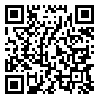Volume 4, Issue 1 (2-2019)
RSJ 2019, 4(1): 9-17 |
Back to browse issues page
Download citation:
BibTeX | RIS | EndNote | Medlars | ProCite | Reference Manager | RefWorks
Send citation to:



BibTeX | RIS | EndNote | Medlars | ProCite | Reference Manager | RefWorks
Send citation to:
A glance on multi-dimensional subject entitled resistive economy in a Medical University. RSJ 2019; 4 (1) :9-17
URL: http://rsj.iums.ac.ir/article-1-92-en.html
URL: http://rsj.iums.ac.ir/article-1-92-en.html
Abstract: (3413 Views)
Background and Objectives: Activities aimed at achieving the goals of the resistive economy by students who are influential groups of the country will lead to the development of society in various aspects such as socio-economic, cultural and even religious. The purpose of this study was to evaluate students' knowledge and practice in relation to resistive economics.
Materials and Methods: This descriptive study conducted among 691 students of medical, dentistry and paramedical schools in five consecutive periods from 2013 to 2016. Samples were collected in simple method. The data were collected by a researcher-made form, comprised of two sections of personal data and questions about resistive economics. Data processing was performed using descriptive statistics.
Results: Students' awareness of resistive economy over time increased from 42.4% in the second half of 2013 to 93.4% in the first half of the 2016. Students' performance on the resistive economy showed that their performance fluctuated over time, but changed over the course of 5 consecutive periods from 8.8 to 8.4%. The question about the person responsible for the issue of resistive economy indicated that most students considered the responsibility of the people and governmental authorities.
Conclusion: Although the results indicate an improvement in students' awareness and about resistive economy, their performance status does not seem satisfactory. Therefore, it is imperative that universities apply specific programs for greater participation and improvement of students' performance in national and social issues.
Materials and Methods: This descriptive study conducted among 691 students of medical, dentistry and paramedical schools in five consecutive periods from 2013 to 2016. Samples were collected in simple method. The data were collected by a researcher-made form, comprised of two sections of personal data and questions about resistive economics. Data processing was performed using descriptive statistics.
Results: Students' awareness of resistive economy over time increased from 42.4% in the second half of 2013 to 93.4% in the first half of the 2016. Students' performance on the resistive economy showed that their performance fluctuated over time, but changed over the course of 5 consecutive periods from 8.8 to 8.4%. The question about the person responsible for the issue of resistive economy indicated that most students considered the responsibility of the people and governmental authorities.
Conclusion: Although the results indicate an improvement in students' awareness and about resistive economy, their performance status does not seem satisfactory. Therefore, it is imperative that universities apply specific programs for greater participation and improvement of students' performance in national and social issues.
| Rights and permissions | |
 |
This work is licensed under a Creative Commons Attribution-NonCommercial 4.0 International License. |



